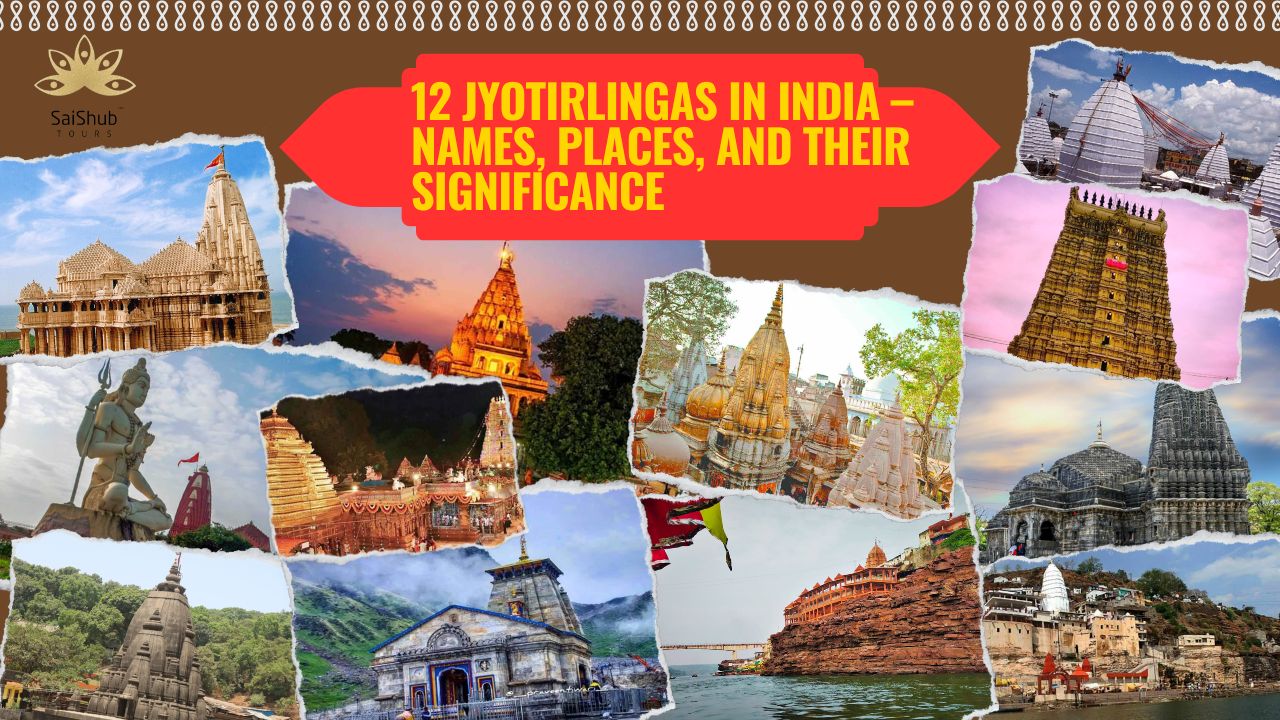
India is known as the land of spirituality, and among its many sacred symbols, the 12 Jyotirlingas of Lord Shiva hold an unparalleled place. These shrines represent the eternal and infinite form of Lord Shiva, who manifests as a pillar of light — a “Jyotirlinga.” Each of these temples is believed to radiate divine energy and carries a unique legend tied to the power of creation, preservation, and destruction.
For devotees, visiting all 12 Jyotirlingas is considered one of the most sacred pilgrimages — a journey that leads to spiritual liberation (moksha).
What Are Jyotirlingas?
The term “Jyotirlinga” is derived from Sanskrit — “Jyoti” meaning light and “Linga” meaning symbol of Shiva. According to Hindu scriptures, Lord Shiva appeared as a column of light (Jyoti) to prove his supreme power to Brahma and Vishnu. These 12 sites are where this divine light manifested, symbolising the presence of Shiva across India.
List of 12 Jyotirlingas in India
Below is the list of the 12 sacred Jyotirlingas, their locations, and their spiritual significance:
1. Somnath Jyotirlinga – Gujarat
Location: Prabhas Patan near Veraval, Saurashtra
Significance: Believed to be the first among the 12 Jyotirlingas, Somnath represents the power of restoration and faith. It has been destroyed and rebuilt several times, symbolising resilience.
Legend: The moon god (Chandra) worshipped Shiva here to regain his lost luster.
2. Mallikarjuna Jyotirlinga – Andhra Pradesh
Location: Srisailam, Kurnool District
Significance: Known as the “Kailash of the South,” this temple represents Shiva and Parvati’s eternal union.
Legend: Shiva and Parvati stayed here to console their son Kartikeya.
3. Mahakaleshwar Jyotirlinga – Madhya Pradesh
Location: Ujjain
Significance: Lord Shiva here is worshipped as Mahakal, the destroyer of time and evil.
Legend: It is believed that devotees visiting Mahakaleshwar are freed from the fear of death and rebirth.
4. Omkareshwar Jyotirlinga – Madhya Pradesh
Location: Mandhata Island on the Narmada River
Significance: The island itself is shaped like the sacred symbol ‘Om’.
Legend: The temple signifies the cosmic vibration of “Om,” representing Shiva’s universal presence.
5. Kedarnath Jyotirlinga – Uttarakhand
Location: Himalayas near the Mandakini River
Significance: One of the most remote Jyotirlingas, accessible only through trekking.
Legend: Pandavas built this temple to seek forgiveness after the Kurukshetra war.
6. Bhimashankar Jyotirlinga – Maharashtra
Location: Pune District
Significance: It represents Shiva as the source of the river Bhima.
Legend: Lord Shiva took the form of Bhimashankar to defeat the demon Tripurasura.
7. Kashi Vishwanath Jyotirlinga – Uttar Pradesh
Location: Varanasi
Significance: One of the most sacred temples in India, symbolising eternal peace and enlightenment.
Legend: It is said that those who die in Kashi attain Moksha with Shiva’s blessing.
8. Trimbakeshwar Jyotirlinga – Maharashtra
Location: Nashik
Significance: The origin of the holy river Godavari, symbolising purity and life.
Legend: Lord Shiva resides here in the form of Trimbakeshwar to bless Rishi Gautam.
9. Vaidyanath Jyotirlinga – Jharkhand
Location: Deoghar
Significance: Also known as Baidyanath Dham, it represents Lord Shiva as the divine healer.
Legend: Ravana offered his ten heads here to please Lord Shiva.
10. Nageshwar Jyotirlinga – Gujarat
Location: Near Dwarka
Significance: Known as the protector from all poisons and evil energies.
Legend: Lord Shiva appeared as Nageshwar to protect his devotee Supriya from a demon.
11. Rameshwaram Jyotirlinga – Tamil Nadu
Location: Rameshwaram Island
Significance: It’s where Lord Rama worshipped Shiva before crossing to Lanka.
Legend: The Lingam here was made by Sita from sand, symbolising devotion and purity.
12. Grishneshwar Jyotirlinga – Maharashtra
Location: Near Ellora Caves, Aurangabad
Significance: The last of the 12 Jyotirlingas, representing compassion and devotion.
Legend: Devotee Kusuma’s faith brought Lord Shiva to life in this holy place.
Spiritual Importance of Visiting All 12 Jyotirlingas
Pilgrims believe that visiting all 12 Jyotirlingas helps cleanse one’s soul and brings spiritual enlightenment. Each shrine represents a different energy of Lord Shiva, and collectively, they depict his complete cosmic form — creator, preserver, and destroyer.
Undertaking this pilgrimage is not just about visiting temples; it’s about connecting deeply with faith, devotion, and the inner self.
Best Time to Visit Jyotirlingas
Winter (October to February): Ideal for northern and central India temples like Kedarnath, Mahakaleshwar, and Omkareshwar.
Monsoon (July to September): Suitable for lush green destinations like Bhimashankar and Trimbakeshwar.
Summer (March to June): Visit southern shrines like Rameshwaram and Srisailam during this time.
Travel Tips for Devotees
Plan your travel in advance and check temple timings.
Dress modestly and carry traditional offerings.
Keep essentials like water, snacks, and comfortable footwear.
Combine Jyotirlinga visits with other nearby spiritual sites for a complete experience.
FAQ
The 12 Jyotirlingas are Somnath, Mallikarjuna, Mahakaleshwar, Omkareshwar, Kedarnath, Bhimashankar, Kashi Vishwanath, Trimbakeshwar, Vaidyanath, Nageshwar, Rameshwaram, and Grishneshwar.
All Jyotirlingas are equally sacred, but Kashi Vishwanath and Somnath are often considered highly significant among devotees.
Yes, many travel agencies offer special Jyotirlinga Yatra tours that cover all 12 temples across India in a planned route.
The Somnath Jyotirlinga in Gujarat is considered the oldest and the first among the twelve.
“Jyoti” means divine light and “Linga” means symbol of Shiva. A Jyotirlinga represents Lord Shiva’s infinite form as a pillar of divine light
Conclusion
The 12 Jyotirlingas in India embody the timeless energy of Lord Shiva, spread across the country to bless devotees in every direction. Each shrine holds centuries of legends, faith, and miracles that continue to inspire millions. Whether you visit one or all, each Jyotirlinga promises a transformative journey — awakening the spirit, purifying the soul, and bringing you closer to divine truth.

